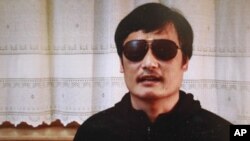Blind Chinese dissident Chen Guangcheng said Wednesday he and his family have filled out passport application forms, and that Chinese authorities tell him travel documents should be issued by the end of the month.
Chen spoke to VOA's Mandarin service from a hospital room in Beijing, where he has been recovering for the past two weeks from injuries sustained during his dramatic escape from house arrest last month.
He said passport photos were taken and that the application forms were delivered to his hospital room Wednesday by Shangdong provincial security officials.
The passport development is the first outward sign of movement in Chen's quest to travel abroad, since government officials earlier this month said they would grant him permission to study in the United States at New York University.
Meanwhile, the diplomatic war of words over the Chen case continued Wednesday, with the Chinese Foreign Ministry again accusing the United States of meddling in China's internal affairs.
The new accusations follow a high-profile trans-continental telephone call Tuesday in which Chen told a U.S. Congressional hearing that he fears for the safety of his family. He said both his nephew and older brother have been recently beaten by Chinese police.
" Chinese Foreign Ministry spokesperson Hong Lei said the U.S. - not China - should be blamed for the standoff. He did not comment on the status of Chen's family.
"On the Chen Guangcheng case, China has made its position known many times," said Hong. "This case again shows the U.S. interference in China's internal affairs and we demand the U.S. handle competent personnel responsible for the issue and prevent similar incidents from happening again with similar measures. China is a country of the rule of law. The constitution and Chinese laws ensure citizens' legitimate rights and interests and at the same time they should also abide by laws and regulations."
Chen was given a four-year prison sentence in 2006 for exposing abuses under China's forced abortion policy aimed at population control. He had been under house arrest since 2010, before fleeing on April 22 to the U.S. embassy in Beijing, where he remained for six days.
The self-taught legal activist agreed to depart the embassy May 2 under a deal reached by U.S. and Chinese authorities that would have allowed him to stay in a safe place in China and study law. But he changed his mind hours after leaving the embassy, saying his family had been threatened, and he wanted to go to the United States.
Chen spoke to VOA's Mandarin service from a hospital room in Beijing, where he has been recovering for the past two weeks from injuries sustained during his dramatic escape from house arrest last month.
He said passport photos were taken and that the application forms were delivered to his hospital room Wednesday by Shangdong provincial security officials.
The passport development is the first outward sign of movement in Chen's quest to travel abroad, since government officials earlier this month said they would grant him permission to study in the United States at New York University.
Meanwhile, the diplomatic war of words over the Chen case continued Wednesday, with the Chinese Foreign Ministry again accusing the United States of meddling in China's internal affairs.
The new accusations follow a high-profile trans-continental telephone call Tuesday in which Chen told a U.S. Congressional hearing that he fears for the safety of his family. He said both his nephew and older brother have been recently beaten by Chinese police.
Chen Guangcheng
Chen Guangcheng- Self-taught lawyer, blinded by fever in infancy
- Jailed in 2006 after exposing forced abortions, sterilizations in China
- Was under house arrest since his release from prison in September, 2010
- Escaped his heavily-guarded home on April 22, 2012
- Stayed at U.S. embassy in Beijing for six days
- Agreed to leave embassy, remain in China, but quickly changed his mind
- Voiced concern for family safety to U.S. Congressional hearings twice by telephone in May
"On the Chen Guangcheng case, China has made its position known many times," said Hong. "This case again shows the U.S. interference in China's internal affairs and we demand the U.S. handle competent personnel responsible for the issue and prevent similar incidents from happening again with similar measures. China is a country of the rule of law. The constitution and Chinese laws ensure citizens' legitimate rights and interests and at the same time they should also abide by laws and regulations."
Chen was given a four-year prison sentence in 2006 for exposing abuses under China's forced abortion policy aimed at population control. He had been under house arrest since 2010, before fleeing on April 22 to the U.S. embassy in Beijing, where he remained for six days.
The self-taught legal activist agreed to depart the embassy May 2 under a deal reached by U.S. and Chinese authorities that would have allowed him to stay in a safe place in China and study law. But he changed his mind hours after leaving the embassy, saying his family had been threatened, and he wanted to go to the United States.





